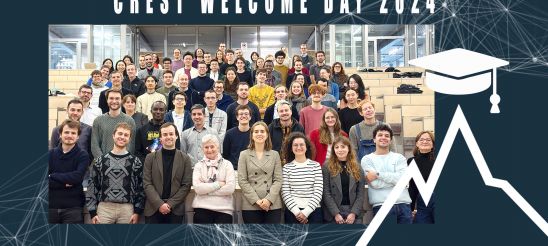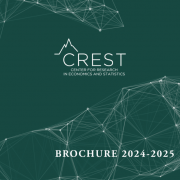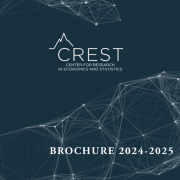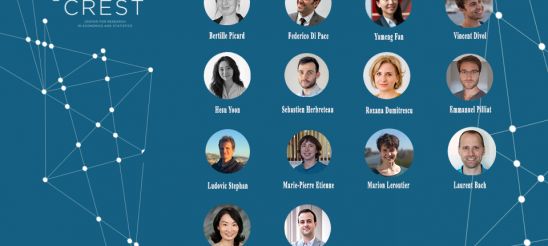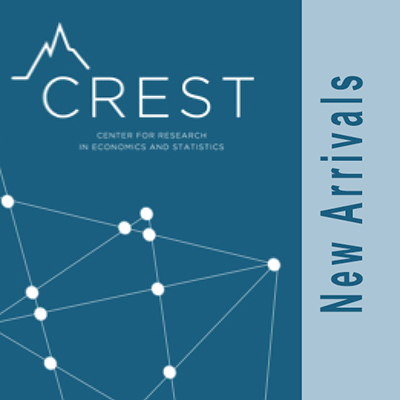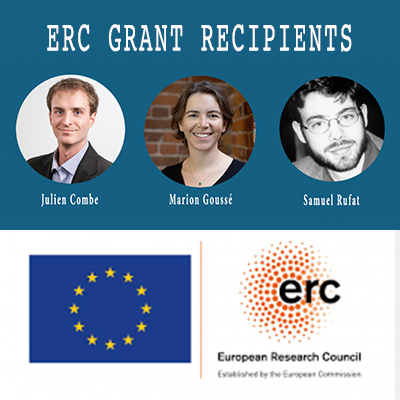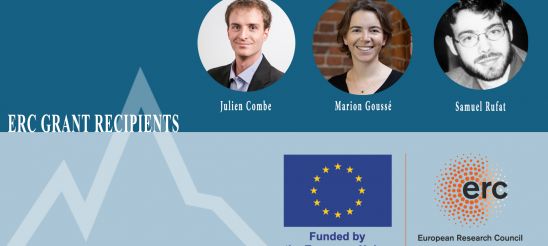On October 10, 2024, CREST held its annual Welcome Day, an event dedicated to welcoming new members (research assistants, PhD students, postdoctoral fellows, and faculty members), offering them an introduction to the laboratory through presentations from the management team and thematic leaders.
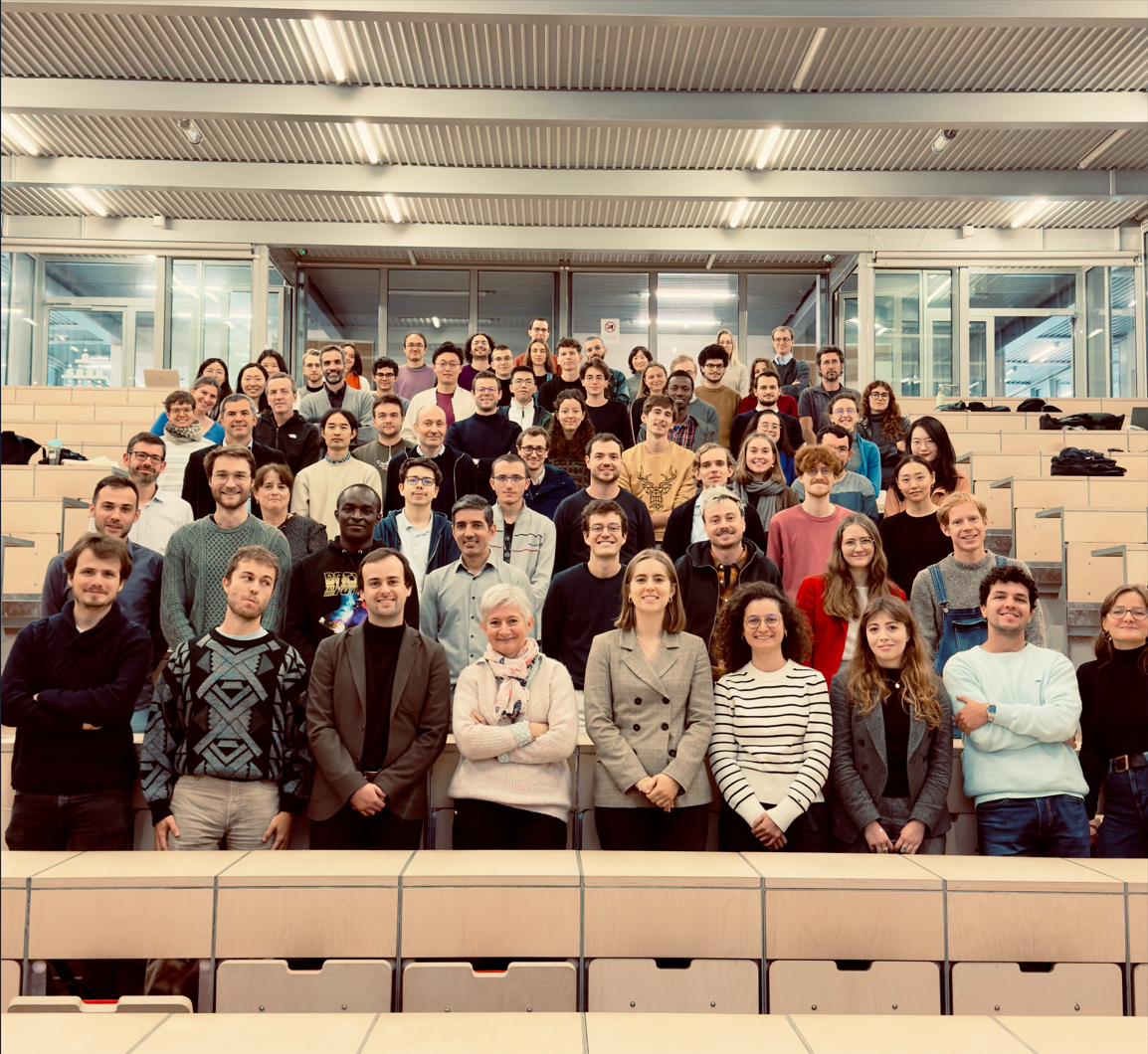
This year, all CREST sites (CREST-ENSAE Paris, CREST-ENSAI, and CREST-Télécom Paris) gathered at the ENSAE Paris campus.
The presentations provided the new members with a comprehensive understanding of CREST’s institutional environment, particularly its affiliations with the Institut Polytechnique de Paris and the University of Rennes. Each newcomer also had the opportunity to introduce themselves and their research project, fostering exchanges with both new and existing members of CREST.
The thematic leaders highlighted well-being initiatives at CREST, as well as the structure of the doctoral program at IP Paris. The event also allowed the administrative team to outline their roles and share useful recommendations.
Our scientific data engineers demonstrated Onyxia, a solution recently deployed in collaboration with GENES.
Finally, CREST PhD students shared information about various reading groups, other lab initiatives, and teaching opportunities available during the doctoral program.
This event also marked the unveiling of CREST’s new institutional brochure for the academic year, which provides an overview of the lab’s research and teaching activities, as well as its prestigious achievements.
Welcome at CREST: Introducing our latest recruits.
Each year, CREST goes beyond its borders to find new minds to keep on offering pioneer research. This year, CREST was able to attract new talents from all around the world (Canada, France, Italy, Switzerland, UEA, UK and USA). These new recruits bring with them a wealth of knowledge, diverse experiences, and a passion for pushing the boundaries of their respective fields. New recruits is always very much appreciated by our PhD students and students from ENSAE Paris, ENSAI and École polytechnique, where they may teach as they arrive with a different background and knowledge base.
As CREST continues to produce groundbreaking research about and for society, the arrival of these scholars marks a significant milestone in our journey. Each professor brings unique expertise that will not only enhance our ongoing projects but also open new avenues for exploration and discovery.
In this article, we will introduce you to our new researchers, delve into their backgrounds, and share their specializations that will contribute to the vibrant research environment at CREST.
Economics
Laurent Bach, Visiting Professor (ESSEC)

Interests: Entrepreneurial Finance, Corporate Governance, Household Finance, Public Economics, Political Economy
Current position: Laurent is currently and Associate Professor of Finance at ESSEC Business School
Laurent completed is PhD from Paris School of Economics in 2010
Federico Di Pace, Associate Professor (ENSAI)
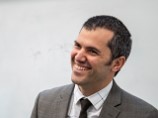
Interests: Monetary Economics, macro-labor, international economics and applied econometrics
Previous position: Federico was previously a Senior Economist at the Bank of England.
Experienced Senior Economist with a demonstrated history of working in the academia and central banking, Federico conducted economic research with particular focus on labor markets and its interaction with monetary policy. He has conducted academic policy pieces using applied theory and time series econometrics. Federico completed his PhD in Economics at Birkbeck College, University of London.
https://sites.google.com/site/federicodipace/home?authuser=0
Yameng Fan, Assistant Professor (ENSAI)

Interests: Macroeconomics of labor markets, political economy, market power and spatial economics.
Previous position: PhD in Economics from Universitat Pompeu Fabra.
Florian Grosset, Assistant Professor (ENSAE Paris, Institut Polytechnique de Paris)

Interests: Development and environmental economics with interests in labor and firms
Previous position: PhD in Sustainable Development from Columbia University
The first strand of his research focuses on labor and networks in lower-income countries. His work explores how individuals’ labor supply decisions are influenced by their social network members, primarily with field experiments. The second strand of Florian’s research focuses on firms’ responses to environmental changes. It combines insights from the natural sciences with applied micro-economic tools for causal identification.
Marion Leroutier, Assistant Professor (ENSAE Paris, Institut Polytechnique de Paris)

Interests: Applied Environmental Economics focusing on two major environmental issues, ambient air pollution and climate change.
Previous position: Postdoctoral fellow at the Institute for Fiscal Studies.
Marion’s research agenda has two angles. First, she investigates the societal cost of air pollution and the causal impact of climate and environmental policies, with an emphasis on health, productivity and distributional effects. In a second and more early-stage angle, Marion studies the determinants of support for green policies, in particular the role of social norms and identity.
Bertille Picard, Assistant Professor (ENSAI)

Interests: Econometrics, Machine Learning applied to policy evaluation and inequalities.
Previous position: PhD in Economics at Aix-Marseille School of Economics (AMSE)
Yuki Tamura, Assistant Professor (École polytechnique, Institut Polytechnique de Paris)

Interests: Micoeconomic Theory, Market Design, Social Choice and Political Economy.
Previous position: Postdoctoral Associate at the Center for Behavioral Institutional Design, NUY Abu Dhabi.
Finance-Insurance
Roxana Dumitrescu, Associate Professor (ENSAE Paris, Institut Polytechnique de Paris)

Interests: Financial Mathematics, Stochastic Control, Stochastic Differential Games, Mean-field Games, Backward Stochastic Differential Equations, Energy Markets, Machine Learning.
Previous position: Associate Professor in Financial Mathematics at King’s College of London.
Sociology
Samuel Rufat, Assistant Professor (École polytechnique, Institut Polytechnique de Paris)

Interests: Urban Geography, Urban Studies, Spatial Analysis, Socio-Economic Inequalities, Segregation, Socio-Spatial Reconfigurations, Environmental justice, …
Previous position: Lecturer at CY Cergy Université Paris Cité (Géographie-cités)
Hesu Yoon, Assistant Professor (ENSAE Paris, Institut Polytechnique de Paris)

Interests: Inequality, Poverty, and mobility, Community and Urban Sociology, Race, Gender and Class, Cultural Sociology, Social Psychology, Computational Social Science, Mixed Methods.
Previous position: PhD in Sociology at Stanford University.
Hesu’s research asks longstanding questions about spatial inequality in urban sociology: Why do some neighborhoods (or cities) grow by attracting people and capital while others do not? How does this place stratification intersect with racial and class-based inequalities? Combining experimental, computational, and qualitative approaches, she interrogates high-status consumers and place entrepreneurs – such as business owners, landlords, and travel writers – who have the power to mold physical, economic, and symbolic urban landscapes.
Statistics
Vincent Divol, Assistant Professor (ENSAE Paris, Institut Polytechnique de Paris)

Interests: Topics at the intersection of statistics and geometry, including statistical optimal transport, geometric inference and topological data analysis.
Previous position: Junior AI Fellow at Université PSL.
Marie-Pierre Etienne, Associate Professor (ENSAI)

Interests: Development of statistical methods for ecology.
Previous position: Assistant Professor at Agrocampus Ouest.
Marie-Pierre is mainly interested in the use of stochastic processes to model and infer biological processes, particularly ecological processes.
Recently she focused mainly on movement ecology application and the development of statistical methods to extract knowledge from the study of animals, but also fishing vessels movement.
Sébastien Herbreteau, Assistant Professor (ENSAI)

Interests: Statistical and Machine Learning Methods for image processing, inverse problems, optimization and mathematical understanding of neural networks.
Previous position: Postdoctoral Fellow in the Biomedical Imaging Group at the Ecole Polytechnique Fédérale de Lausanne.
Emmanuel Pilliat, Assistant Professor (ENSAI)

Interests: Machine Learning and High-Dimensional Statistics.
Previous position: Postdoctoral Fellow at ENS Lyon.
Ludovic Stephan, Assistant Professor (ENSAI)

Interests: Random graphs, inference problems, machine learning theory.
Previous position: Postdoctoral Fellow in the idePHICS lab at Ecole Polytechnique Fédérale de Lausanne.
My research interests involve the rigorous study of statistical-physics inspired methods, from belief propagation to replica equations.
Welcome at CREST: Introducing our latest recruits.
Each year, CREST goes beyond its borders to find new minds to keep on offering pioneer research. This year, CREST was able to attract new talents from all around the world (Canada, France, Italy, Switzerland, UEA, UK and USA). These new recruits bring with them a wealth of knowledge, diverse experiences, and a passion for pushing the boundaries of their respective fields. New recruits is always very much appreciated by our PhD students and students from ENSAE Paris, ENSAI and École polytechnique, where they may teach as they arrive with a different background and knowledge base.
As CREST continues to produce groundbreaking research about and for society, the arrival of these scholars marks a significant milestone in our journey. Each professor brings unique expertise that will not only enhance our ongoing projects but also open new avenues for exploration and discovery.
In this article, we will introduce you to our new researchers, delve into their backgrounds, and share their specializations that will contribute to the vibrant research environment at CREST.
Economics
Laurent Bach, Visiting Professor (ESSEC)

Interests: Entrepreneurial Finance, Corporate Governance, Household Finance, Public Economics, Political Economy
Current position: Laurent is currently and Associate Professor of Finance at ESSEC Business School
Laurent completed is PhD from Paris School of Economics in 2010
Federico Di Pace, Associate Professor (ENSAI)

Interests: Monetary Economics, macro-labor, international economics and applied econometrics
Previous position: Federico was previously a Senior Economist at the Bank of England.
Experienced Senior Economist with a demonstrated history of working in the academia and central banking, Federico conducted economic research with particular focus on labor markets and its interaction with monetary policy. He has conducted academic policy pieces using applied theory and time series econometrics. Federico completed his PhD in Economics at Birkbeck College, University of London.
https://sites.google.com/site/federicodipace/home?authuser=0
Yameng Fan, Assistant Professor (ENSAI)

Interests: Macroeconomics of labor markets, political economy, market power and spatial economics.
Previous position: PhD in Economics from Universitat Pompeu Fabra.
Florian Grosset, Assistant Professor (ENSAE Paris, Institut Polytechnique de Paris)

Interests: Development and environmental economics with interests in labor and firms
Previous position: PhD in Sustainable Development from Columbia University
The first strand of his research focuses on labor and networks in lower-income countries. His work explores how individuals’ labor supply decisions are influenced by their social network members, primarily with field experiments. The second strand of Florian’s research focuses on firms’ responses to environmental changes. It combines insights from the natural sciences with applied micro-economic tools for causal identification.
Marion Leroutier, Assistant Professor (ENSAE Paris, Institut Polytechnique de Paris)

Interests: Applied Environmental Economics focusing on two major environmental issues, ambient air pollution and climate change.
Previous position: Postdoctoral fellow at the Institute for Fiscal Studies.
Marion’s research agenda has two angles. First, she investigates the societal cost of air pollution and the causal impact of climate and environmental policies, with an emphasis on health, productivity and distributional effects. In a second and more early-stage angle, Marion studies the determinants of support for green policies, in particular the role of social norms and identity.
Bertille Picard, Assistant Professor (ENSAI)

Interests: Econometrics, Machine Learning applied to policy evaluation and inequalities.
Previous position: PhD in Economics at Aix-Marseille School of Economics (AMSE)
Yuki Tamura, Assistant Professor (École polytechnique, Institut Polytechnique de Paris)

Interests: Micoeconomic Theory, Market Design, Social Choice and Political Economy.
Previous position: Postdoctoral Associate at the Center for Behavioral Institutional Design, NUY Abu Dhabi.
Finance-Insurance
Roxana Dumitrescu, Associate Professor (ENSAE Paris, Institut Polytechnique de Paris)

Interests: Financial Mathematics, Stochastic Control, Stochastic Differential Games, Mean-field Games, Backward Stochastic Differential Equations, Energy Markets, Machine Learning.
Previous position: Associate Professor in Financial Mathematics at King’s College of London.
Sociology
Samuel Rufat, Assistant Professor (École polytechnique, Institut Polytechnique de Paris)

Interests: Urban Geography, Urban Studies, Spatial Analysis, Socio-Economic Inequalities, Segregation, Socio-Spatial Reconfigurations, Environmental justice, …
Previous position: Lecturer at CY Cergy Université Paris Cité (Géographie-cités)
Hesu Yoon, Assistant Professor (ENSAE Paris, Institut Polytechnique de Paris)

Interests: Inequality, Poverty, and mobility, Community and Urban Sociology, Race, Gender and Class, Cultural Sociology, Social Psychology, Computational Social Science, Mixed Methods.
Previous position: PhD in Sociology at Stanford University.
Hesu’s research asks longstanding questions about spatial inequality in urban sociology: Why do some neighborhoods (or cities) grow by attracting people and capital while others do not? How does this place stratification intersect with racial and class-based inequalities? Combining experimental, computational, and qualitative approaches, she interrogates high-status consumers and place entrepreneurs – such as business owners, landlords, and travel writers – who have the power to mold physical, economic, and symbolic urban landscapes.
Statistics
Vincent Divol, Assistant Professor (ENSAE Paris, Institut Polytechnique de Paris)

Interests: Topics at the intersection of statistics and geometry, including statistical optimal transport, geometric inference and topological data analysis.
Previous position: Junior AI Fellow at Université PSL.
Marie-Pierre Etienne, Associate Professor (ENSAI)

Interests: Development of statistical methods for ecology.
Previous position: Assistant Professor at Agrocampus Ouest.
Marie-Pierre is mainly interested in the use of stochastic processes to model and infer biological processes, particularly ecological processes.
Recently she focused mainly on movement ecology application and the development of statistical methods to extract knowledge from the study of animals, but also fishing vessels movement.
Sébastien Herbreteau, Assistant Professor (ENSAI)

Interests: Statistical and Machine Learning Methods for image processing, inverse problems, optimization and mathematical understanding of neural networks.
Previous position: Postdoctoral Fellow in the Biomedical Imaging Group at the Ecole Polytechnique Fédérale de Lausanne.
Emmanuel Pilliat, Assistant Professor (ENSAI)

Interests: Machine Learning and High-Dimensional Statistics.
Previous position: Postdoctoral Fellow at ENS Lyon.
Ludovic Stephan, Assistant Professor (ENSAI)

Interests: Random graphs, inference problems, machine learning theory.
Previous position: Postdoctoral Fellow in the idePHICS lab at Ecole Polytechnique Fédérale de Lausanne.
My research interests involve the rigorous study of statistical-physics inspired methods, from belief propagation to replica equations.
3 CREST Researchers Receive European Research Council (ERC) Grants
Three researchers from CREST have been awarded prestigious grants by the European Research Council (ERC), highlighting their dedication to advancing research in the social and economic sciences. These three grants add to the three existing ERC projects underway at the laboratory, providing critical support for innovative research.
The funding will enable the researchers to delve deeper into their fields and explore a variety of important themes:
- The role of human behavior in the assessment and management of risks related to floods and other disasters.
- Improving the efficiency of allocation markets, especially when external options play a crucial role.
- Analyzing how the distribution of skills and workers in the economy is shaped by the interaction between the labor market, the marriage market, and multidimensional skills.
This article introduces the grant recipients, their backgrounds, and the goals of their ERC-funded research.
Julien Combe (CREST – École polytechnique): Market Design and Participation: Comprehensive Design for Matching Markets (MADPART)

Julien Combe, a Professor at École polytechnique, is a permanent researcher at CREST and an affiliated researcher at the Institut des Politiques Publiques and the Centre for Economic and Policy Research (CEPR). After obtaining his PhD from the Paris School of Economics in 2017, he worked as a Research Associate at University College London before joining CREST. Julien specializes in economics, particularly in theoretical and empirical market design.
In his current research, Julien explores dynamic centralized matching markets. He also examines how external options affect participation in matching markets. This research laid the groundwork for his ERC project by highlighting the need to incorporate these outside options into the design of these matching markets. These studies have opened new perspectives on designing more effective and inclusive policies.
“The ERC Starting Grant will allow me to push ambitious projects by allowing me to create an effective team of research around the topic with research assistants, a postdoctoral researcher and a PhD student. It will also allow me to fund an intervention to understand how families react to information in their participation decisions to daycare assignment procedures which would not have been possible otherwise. Last, it will also give the means to organize various events to gather researchers from the field and help to making the Parisian area a true European and world hub for Market Design.”
The ERC project MADPART aims to improve the design of assignment markets by considering external options and participation decisions. Many assignment markets, such as those for public school teachers, daycare placements, organ allocations, and social housing, operate with limited or no monetary transfers and are influenced by external opportunities. MADPART seeks to understand how these outside options discourage participation and undermine policy objectives, while also identifying innovative designs to enhance market functioning. By combining advanced theoretical models with cutting-edge empirical methods, the project will leverage unique and novel datasets from four assignment markets to analyze dynamic interactions with external options. The expected outcomes of MADPART aim to provide a more comprehensive understanding of assignment markets and potentially lead to significant policy innovations, allowing for better public resource allocation strategies that account for the choice of participants among multiple options.
Funded by the European Union (ERC STG 101162014). Views and opinions expressed are however those of the author only and do not necessarily reflect those of the European Union or the European Research Council Executive Agency.
Marion Goussé (CREST – GENES – ENSAI): Skills Markets: Marriage and Labor (SkiM2Lab)

Marion Goussé is an Associate Professor of Economics at ENSAI, permanent researcher at CREST in Bruz. She obtained her PhD from Sciences Po Paris and previously was a professor at Laval University in Canada. Marion is also a research affiliate at Institut des Politiques Publiques, IZA and she is a member of AFEPOP (Association Française des Économistes de la Population) and a network member of HCEO.
Marion Goussé’s previous research primarily addressed themes in labor and family economics. Her work focused on the determinants of labor income inequality, analyzing both intra-household dynamics and broader labor market patterns. She has applied advanced econometric techniques to understand the interplay between marriage markets, labor supply, and home production. This line of inquiry laid a strong foundation for her ERC project, demonstrating significant findings such as the impact of marriage market dynamics on labor supply decisions and the economic outcomes of households. Her current research continues to explore these themes, particularly examining how discrimination and family structures affect labor market outcomes.
“The ERC grant represents a unique opportunity to me to build an international team of researchers around my project with two postdocs, two PhDs students and with collaborators from Canada, Luxembourg and Sweden. This project is intensive in human capital as we will need to build, solve and estimate complex structural household matching models of the labor market using very rich databases. The project’s results will help answer broad impactful questions around the persistence and evolution of gender and regional gaps in skills, wages and marriage rates.”
The SkiM2Lab project aims to address gaps in understanding the distribution of workers across jobs and geographic areas, which has significant implications for growth, social welfare, and inequality. The project will develop state-of-the-art multidimensional matching models with two specific objectives:
- Labor and Marriage Markets Interactions: The project will analyze how labor and marriage markets intersect, using equilibrium models to understand the distribution of multidimensional skill sets across different geographic locations. This will shed light on how family and labor markets interact to influence wage disparities and occupational segregation by gender and region.
- Multidimensional Skills Matching: By leveraging big data, such as online resumes and job postings, alongside machine learning and natural language processing technologies, the project aims to identify and analyze skills at a granular level. This will enable the development of innovative models that better match skills to jobs, thereby enhancing understanding of the labor market dynamics and potentially informing more effective policy interventions.
The SkiM2Lab project represents a significant step forward in labor economics making a bridge between the fields of labor economics and family economics to better address the complex realities of modern labor and family life.
Funded by the European Union (ERC STG 101161432). Views and opinions expressed are however those of the author only and do not necessarily reflect those of the European Union or the European Research Council Executive Agency.
Samuel Rufat (CREST – École polytechnique): Filling the Behavioral Gap in Disaster Risk Reduction and Climate Change Adaptation (FiBeGa)

Samuel Rufat is a Professor of Geography at École polytechnique who recently joined the social sciences group of the CREST. He holds a joint European PhD from ENS Lyon and University of Bucharest, and a Habilitation from University Paris Cité. His research interests include urban geography, environmental inequalities, disaster risk reduction, climate change adaptation and computational social science. He is an expert with the Community of European Research and Innovation for Security (CERIS) Disaster Resilient Societies group for the European Commission. Previously, he was a Professor of Geography at CY Clergy Paris University and a fellow of the Institut Universitaire de France.
His current research explores the empirical validation of social vulnerability and resilience assessments and the role of human behavior in disaster outcomes. This research had laid the groundwork for an ERC project, which aims to refine the models and understanding of the impacts of disasters and climate change on metropolises, thereby informing more effective risk reduction strategies and adaptation policies.
“Competing theories from different fields are usually implemented on different case studies or respondents instead of being empirically compared. Some assume that risk awareness or information campaigns will lead to mitigation behavior, but the opposite has been repeatedly verified. This ERC grant allows for cross-validation, testing multiple theories from different fields, across different case studies, in space, short-term and long-term. Such an European funding is also the best opportunity to involve stakeholders from every level, from local authorities and citizen representatives to the European level, to inform policies, emergency management and male them more efficient, saving lives and public money.”
The FiBeGa project, “Filling the Behavioral Gap in Disaster Risk Reduction and Climate Change Adaptation”, aims to address a critical gap in current risk assessment methodologies: the lack of consideration for actual human behavior. Despite significant investments in disaster risk reduction, current policies often fail to reduce risks and losses effectively due to a mismatch between theoretical models and empirical reality. The EU vision of a disaster-and climate-resilient society cannot be achieved with the current approach. The ERC-funded FiBeGa project will lift existing barriers to predicting risk perception and behavior to foster a shift from “behavior-blind” to “behavior-aware” assessments and policies. By focusing on four major urban centers – Paris, Barcelona, Bucharest – the project will create demonstrators that provide a scalable and transferable model for improving disaster preparedness and response across diverse contexts. The outcomes of the FiBeGa project will include interactive, spatially explicit simulations that allow decision-makers to visualize and refine their strategies in real-time, fostering more resilient and adaptive communities in the face of increasing climate risks.
Funded by the European Union (ERC CoG 101044374). Views and opinions expressed are however those of the author only and do not necessarily reflect those of the European Union or the European Research Council Executive Agency.
3 CREST Researchers Receive European Research Council (ERC) Grants
Three researchers from CREST have been awarded prestigious grants by the European Research Council (ERC), highlighting their dedication to advancing research in the social and economic sciences. These three grants add to the three existing ERC projects underway at the laboratory, providing critical support for innovative research.
The funding will enable the researchers to delve deeper into their fields and explore a variety of important themes:
- The role of human behavior in the assessment and management of risks related to floods and other disasters.
- Improving the efficiency of allocation markets, especially when external options play a crucial role.
- Analyzing how the distribution of skills and workers in the economy is shaped by the interaction between the labor market, the marriage market, and multidimensional skills.
This article introduces the grant recipients, their backgrounds, and the goals of their ERC-funded research.
Julien Combe (CREST – École polytechnique): Market Design and Participation: Comprehensive Design for Matching Markets (MADPART)

Julien Combe, a Professor at École polytechnique, is a permanent researcher at CREST and an affiliated researcher at the Institut des Politiques Publiques and the Centre for Economic and Policy Research (CEPR). After obtaining his PhD from the Paris School of Economics in 2017, he worked as a Research Associate at University College London before joining CREST. Julien specializes in economics, particularly in theoretical and empirical market design.
In his current research, Julien explores dynamic centralized matching markets. He also examines how external options affect participation in matching markets. This research laid the groundwork for his ERC project by highlighting the need to incorporate these outside options into the design of these matching markets. These studies have opened new perspectives on designing more effective and inclusive policies.
“The ERC Starting Grant will allow me to push ambitious projects by allowing me to create an effective team of research around the topic with research assistants, a postdoctoral researcher and a PhD student. It will also allow me to fund an intervention to understand how families react to information in their participation decisions to daycare assignment procedures which would not have been possible otherwise. Last, it will also give the means to organize various events to gather researchers from the field and help to making the Parisian area a true European and world hub for Market Design.”
The ERC project MADPART aims to improve the design of assignment markets by considering external options and participation decisions. Many assignment markets, such as those for public school teachers, daycare placements, organ allocations, and social housing, operate with limited or no monetary transfers and are influenced by external opportunities. MADPART seeks to understand how these outside options discourage participation and undermine policy objectives, while also identifying innovative designs to enhance market functioning. By combining advanced theoretical models with cutting-edge empirical methods, the project will leverage unique and novel datasets from four assignment markets to analyze dynamic interactions with external options. The expected outcomes of MADPART aim to provide a more comprehensive understanding of assignment markets and potentially lead to significant policy innovations, allowing for better public resource allocation strategies that account for the choice of participants among multiple options.
Funded by the European Union (ERC STG 101162014). Views and opinions expressed are however those of the author only and do not necessarily reflect those of the European Union or the European Research Council Executive Agency.
Marion Goussé (CREST – GENES – ENSAI): Skills Markets: Marriage and Labor (SkiM2Lab)

Marion Goussé is an Associate Professor of Economics at ENSAI, permanent researcher at CREST in Bruz. She obtained her PhD from Sciences Po Paris and previously was a professor at Laval University in Canada. Marion is also a research affiliate at Institut des Politiques Publiques, IZA and she is a member of AFEPOP (Association Française des Économistes de la Population) and a network member of HCEO.
Marion Goussé’s previous research primarily addressed themes in labor and family economics. Her work focused on the determinants of labor income inequality, analyzing both intra-household dynamics and broader labor market patterns. She has applied advanced econometric techniques to understand the interplay between marriage markets, labor supply, and home production. This line of inquiry laid a strong foundation for her ERC project, demonstrating significant findings such as the impact of marriage market dynamics on labor supply decisions and the economic outcomes of households. Her current research continues to explore these themes, particularly examining how discrimination and family structures affect labor market outcomes.
“The ERC grant represents a unique opportunity to me to build an international team of researchers around my project with two postdocs, two PhDs students and with collaborators from Canada, Luxembourg and Sweden. This project is intensive in human capital as we will need to build, solve and estimate complex structural household matching models of the labor market using very rich databases. The project’s results will help answer broad impactful questions around the persistence and evolution of gender and regional gaps in skills, wages and marriage rates.”
The SkiM2Lab project aims to address gaps in understanding the distribution of workers across jobs and geographic areas, which has significant implications for growth, social welfare, and inequality. The project will develop state-of-the-art multidimensional matching models with two specific objectives:
- Labor and Marriage Markets Interactions: The project will analyze how labor and marriage markets intersect, using equilibrium models to understand the distribution of multidimensional skill sets across different geographic locations. This will shed light on how family and labor markets interact to influence wage disparities and occupational segregation by gender and region.
- Multidimensional Skills Matching: By leveraging big data, such as online resumes and job postings, alongside machine learning and natural language processing technologies, the project aims to identify and analyze skills at a granular level. This will enable the development of innovative models that better match skills to jobs, thereby enhancing understanding of the labor market dynamics and potentially informing more effective policy interventions.
The SkiM2Lab project represents a significant step forward in labor economics making a bridge between the fields of labor economics and family economics to better address the complex realities of modern labor and family life.
Funded by the European Union (ERC STG 101161432). Views and opinions expressed are however those of the author only and do not necessarily reflect those of the European Union or the European Research Council Executive Agency.
Samuel Rufat (CREST – École polytechnique): Filling the Behavioral Gap in Disaster Risk Reduction and Climate Change Adaptation (FiBeGa)

Samuel Rufat is a Professor of Geography at École polytechnique who recently joined the social sciences group of the CREST. He holds a joint European PhD from ENS Lyon and University of Bucharest, and a Habilitation from University Paris Cité. His research interests include urban geography, environmental inequalities, disaster risk reduction, climate change adaptation and computational social science. He is an expert with the Community of European Research and Innovation for Security (CERIS) Disaster Resilient Societies group for the European Commission. Previously, he was a Professor of Geography at CY Clergy Paris University and a fellow of the Institut Universitaire de France.
His current research explores the empirical validation of social vulnerability and resilience assessments and the role of human behavior in disaster outcomes. This research had laid the groundwork for an ERC project, which aims to refine the models and understanding of the impacts of disasters and climate change on metropolises, thereby informing more effective risk reduction strategies and adaptation policies.
“Competing theories from different fields are usually implemented on different case studies or respondents instead of being empirically compared. Some assume that risk awareness or information campaigns will lead to mitigation behavior, but the opposite has been repeatedly verified. This ERC grant allows for cross-validation, testing multiple theories from different fields, across different case studies, in space, short-term and long-term. Such an European funding is also the best opportunity to involve stakeholders from every level, from local authorities and citizen representatives to the European level, to inform policies, emergency management and male them more efficient, saving lives and public money.”
The FiBeGa project, “Filling the Behavioral Gap in Disaster Risk Reduction and Climate Change Adaptation”, aims to address a critical gap in current risk assessment methodologies: the lack of consideration for actual human behavior. Despite significant investments in disaster risk reduction, current policies often fail to reduce risks and losses effectively due to a mismatch between theoretical models and empirical reality. The EU vision of a disaster-and climate-resilient society cannot be achieved with the current approach. The ERC-funded FiBeGa project will lift existing barriers to predicting risk perception and behavior to foster a shift from “behavior-blind” to “behavior-aware” assessments and policies. By focusing on four major urban centers – Paris, Barcelona, Bucharest – the project will create demonstrators that provide a scalable and transferable model for improving disaster preparedness and response across diverse contexts. The outcomes of the FiBeGa project will include interactive, spatially explicit simulations that allow decision-makers to visualize and refine their strategies in real-time, fostering more resilient and adaptive communities in the face of increasing climate risks.
Funded by the European Union (ERC CoG 101044374). Views and opinions expressed are however those of the author only and do not necessarily reflect those of the European Union or the European Research Council Executive Agency.
VoxEU Column Central bankers and trade ministers: How monetary policy can prevent trade wars by Stephane Auray, Michael B Devereux and Aurélien Eyquem
10 Jul 2024
Les accords de libre-échange, un coupable idéal bien pratique
Stéphane Auray, professeur d’économie à l’ENSAI et chercheur au CREST, apporte son éclairage dans cet article du magazine Pour l’Eco.
Le 22 février 2024
Les accords de libre-échange, un coupable idéal bien pratique
Stéphane Auray, professeur d’économie à l’ENSAI et chercheur au CREST, apporte son éclairage dans cet article du magazine Pour l’Eco.
Le 22 février 2024
Le système d’assurance-chômage aux États-Unis et son parallèle avec la France
Un article de Stéphane Auray, enseignant-chercheur en économie CREST-ENSAI.
30 janvier 2024
Le système d’assurance-chômage aux États-Unis et son parallèle avec la France
Un article de Stéphane Auray, enseignant-chercheur en économie CREST-ENSAI.
30 janvier 2024

